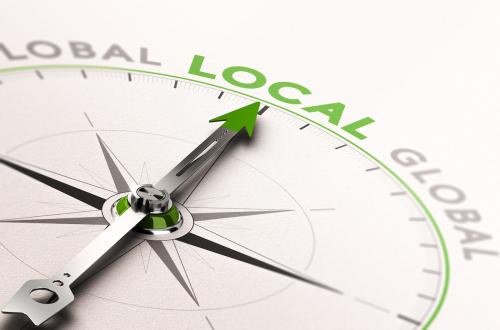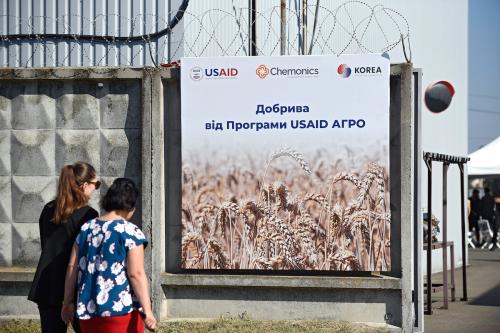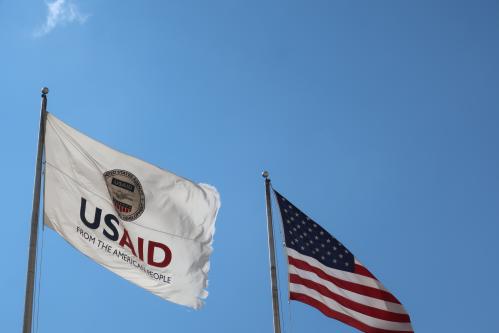We have good news and we have bad news.
Here is the good news: The Ebola infection rate in Liberia has started to subside. Last September the U.S. Centers for Disease Control predicted that the number of people infected could hit 1.4 million if substantial behavioral changes in Sierra Leone and Liberia do not occur. Happily, these predictions have so far failed to materialize.
Instead, Sierra Leone, as of January 29, 2015, has reported 2,859 deaths, out of a confirmed 8,015 confirmed cases. In Liberia, the worst hit country, confirmed cases are 8,577, with 3,694 fatalities (as of January 25, 2015). Even more heartening, most experts now believe that the epidemic is heading towards a phase of rapid decline by mid-year.
And the bad news? The human and economic damage has been harrowing. The World Bank estimates a direct economic cost in money terms of $500 million. Considering that the three countries at the nexus of the epidemic have a combined GDP of just approximately $13 billion (equivalent to the GDP of the nearby city of Abidjan in Côte d’Ivoire), the impact has been nothing short of catastrophic. When the ripple effects due to stigma, loss of productive labor, social distress and security are taken into account, the full consequences become nearly too much to model. All three countries are expected to register negative growth this year.
Yet, I rule that the overall balance sheet of Ebola’s devastating sweep across West Africa shall be positive going forward: 2015 will be the year of innovation in defeating Ebola and transforming the way we think about tackling disasters on the continent. Here is why.
First, the crisis provided Africa with a fine opportunity to show self-initiative and autonomy in designing complex private-public responses to its own problem.
Within a few days of commencing discussions in November last year, African business leaders were able to set up an emergency fund of nearly $30 million under the aegis of the African Union (AU), with none of the endless, donor-driven, bureaucratic writhing and report writing that was in evidence in the early years of the HIV crisis.
That there is now a pan-African business community capable of acting in concert with the AU concretely and creatively to address regional social problems is massively significant, seeing how slow the New Partnership for African Development (NEPAD), which has similar ambitions, has been in the past. A turn on the curve has certainly been made, and 2015 promises to continue it.
Second, African business leaders have recognized technology, social innovation, talent/manpower development, and youth engagement as central to the effort the fund was supposed to underwrite. This is a veritable breakthrough in thinking. In the past, major pan-African initiatives such as the Lagos Plan of Action have tended to be top-heavy, even while seeking to mobilize a poorly defined grassroots. The new thinking evident in the Ebola Emergency Fund is rich in emphases on change-makers, enablers, local agents of transformation, and practical, iterative, incremental improvements, with less dependence on the logic and rhetoric of the large-scale, wide-sweeping, “trust the policy oligarchy” approach.
Third, and most interesting for me, the use of social innovation and technology is being discussed with a business mindset, not a charity one. The days when information and communication technologies (ICTs) were framed by NGOs using philosophical language such as “digital divide” are receding quite fast. Indeed, one of the most interesting interventions to date has involved U.N. agencies partnering with mobile money companies, such as Splash in Sierra Leone, to automate allowance and stipend payments in Ebola hit areas. There is even a project seeking to exploit the novelty of bitcoin to fund Ebola relief.
Crucially, the lessons from the epidemic itself support such creative reframing of problems. Initially, the traditional “medical relief” way of thinking had held complete sway. These include quarantines, disaster camps, medicine shipments, Western humanitarian volunteers, and the incessant peddling of African gloom.
Soon, however, it became obvious that a much more variegated response was underway. Ghanaian social activists took the battle online to defend the quality of information flows. A young Liberian policy expert clamped down on stereotypes during a widely telecast BBC panel discussion on the issue. African musicians demanded leadership in charity concerts. A new, assertive Africa was evident for all to see. Hopefully, in 2015, we will see this assertiveness become a foundation for addressing the continent’s problems.
The age-old African health crisis paradigm has itself received a massive jolt. Sanitation campaigns like the type FACE Africa specializes in became as integral as drug distribution, as a general consciousness of the dire importance of hygiene blossomed overnight across West Africa. Nutrition, community participation, supply chain transformation (handling test samples and ensuring that results do not get jumbled up became a major element of the day-to-day relief operation), public health communications, and the interplay of security and health all rose to the fore in a way that showed the brittleness of the established approach to health in Africa within the international development industry.
We saw impressive experiments in early sensing; witnessed the tracking of the spreading infection via mobile phone technology; monitored the distribution of rapid diagnostic tools in real time; and watched in fascination as interveners explored more innovative ways to pass health tips to teenage Africans.
Sadly however, traditional mobilization and resource use approaches are still going strong, and their adherents have shown surprising immunity to powerful new ideas, with the end result that precious relief material continue to be diverted as they have been in the past, and conference-hogging NGO staff still ignore amazing pockets of innovation.
The rise of new media meant, however, that more and more people have been empowered to demand more of the shifts in African problem solving we have seen so far in the crisis.
2015 is set to be the year in which new ideas shall play a great role in conquering Ebola, in setting a new course for universal health thinking in Africa (a Lancet Commission report on issues of this nature shall be released in September of this year), and by so doing restoring confidence in African ingenuity and change-making philosophies.
Note:
Bright B. Simons is the inventor of a platform for real-time monitoring of medicine quality and distribution using mobile phone and internet technologies called
Goldkeys
and president of
mPedigree
. He is also a fellow at a think tank based in Ghana, called IMANI. This blog reflects the views of the authors only and does not reflect the views of the Africa Growth Initiative.



Commentary
The Silver Lining in Africa’s Ebola Cloud
February 3, 2015